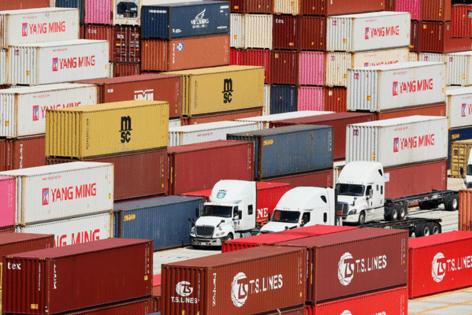Trump tariffs are hurting US and global economy, OECD warns
Published in News & Features
PARIS — Donald Trump’s combative trade policies have tipped the world economy into a downturn, with the U.S. among the hardest hit, the OECD said.
The Paris-based organization slashed its global forecasts for the second time this year, citing the impact of the American president’s tariff onslaught. The combination of trade barriers and uncertainty are hitting confidence and holding back investment, it said, while also warning that protectionism is adding to inflationary pressures.
The OECD now forecasts global economic growth to slow to 2.9% this year from 3.3% in 2024. It expects the rate of expansion in the U.S. will tumble further, to 1.6% from 2.8% — an outlook that is significantly lower than its projection in March.
“Weakened economic prospects will be felt around the world, with almost no exception,” Chief Economist Alvaro Pereira said. “Lower growth and less trade will hit incomes and slow job growth.”
The assessment indicates how Trump’s policies have become the most pressing problem for the global economy, with no easy solution in sight. The situation could yet be exacerbated by retaliation from U.S. trading partners, a further erosion of confidence, or another bout of repricing on financial markets, the OECD said.
The club of 38 rich countries published its forecasts just as its members’ ministers convene in Paris for an annual meeting. Top commerce officials are expected there include U.S. trade representative Jamieson Greer and E.U. trade commissioner Maros Sefcovic. Lin Feng, a representative from China’s Ministry of Commerce, is also scheduled to attend.
“Agreements to ease trade tensions and lower tariffs and other trade barriers will be instrumental to revive growth and investment and avoid rising prices,” the OECD said. “This is by far the most important policy priority.”
Yet the organization also said that even if Trump reversed course on tariffs, the bonus in terms of growth and reduced inflation would not materialize immediately, due to a persistent drag from heightened uncertainty over policy.
For the U.S., the OECD said curbs on immigration and a sizable reduction in the federal workforce add to the trade-related drag on the economy. It also cautioned that the budget deficit will expand further as the effect of weaker economic activity will more than offset spending cuts and revenues from tariffs.
“The main headwinds are lower export growth as a result of retaliatory measures from trading partners, the impact of high policy uncertainty, and a marked slowdown in net immigration,” OECD Secretary General Mathias Cormann told reporters on Tuesday.
Inflation in the U.S. will also move higher this year, making it likely that the Federal Reserve will not resume easing policy until 2026, according to the OECD. That process may even be derailed if consumer-price expectations get de-anchored, it added.
For other central banks, the OECD also urged continued vigilance. While it expects inflation to ease to their targets in 2026, that process will now take longer, and the pace of price increases may even increase before easing again, it said.
Besides the fallout from global trade, the organization also warned that fiscal risks are intensifying around the world, with “tremendous” pressures for more spending on defense, climate and aging populations. It called for governments to reduce non-essential spending and raise revenues by broadening tax bases.
---------
—With assistance from Jana Randow.
©2025 Bloomberg L.P. Visit bloomberg.com. Distributed by Tribune Content Agency, LLC.







Comments